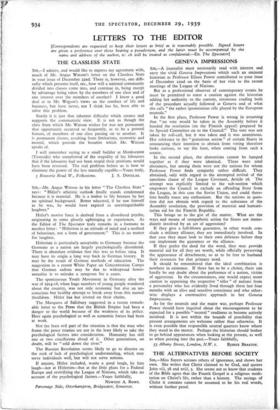Sut,—A journalist must necessarily read with interest and envy the
vivid Geneva Impressions which such an eminent historian as Professor Eileen Power contributed to your issue of December 22nd on the basis of her visit to the recent meetings of the League of Nations.
But as a professional observer of contemporary events he must be permitted to enter a caution against the historian adding her authority to the current, erroneous reading both of the procedure actually followed at Geneva and of what she calls " the rather ignominious role played by the European neutrals."
In the first place, Professor Power is wrong in assuming that " no vote would be taken in the Assembly before it handed the resolution (on the Finnish appeal) prepared by its Special Committee on to the Council" The vote was not taken by roll-call, but it was taken and it was unanimous. Her reference to the " gratuitous action " of certain States in announcing their intention to abstain from voting therefore looks curious, to say the least, when coming from such a source.
In the second place, the abstentions cannot be lumped together as if they were identical. There were total abstainers, but among them were not the nations for whom Professor Power finds sympathy rather difficult. They abstained, only with regard to the attempted revival of the sanctions clause of the League Covenant, Article 16. The attempt was explicitly limited to the sub-section which empowers the Council to exclude an offending State from the League, in this case the Soviet Union, and could there- fore hardly rouse any enthusiasm. But the nations in ques- tion did not abstain with regard to the substance of the Assembly resolution, the provision of material and humani- tarian aid for the Finnish Republic.
This brings us to the gist of the matter. What are the ways and means of sympathetic action for States not imme- diately involved by an act of aggression?
If they give a full-blown guarantee, in other words con- clude a military alliance, they are immediately involved. In that case they must look to their own defences before they can implement the guarantee or the alliance.
If they prefer the deed for the word, they may provide material aid for all they are worth, while officially preserving the appearance of detachment, so as to be free to husband their resources for that primary need.
It should be remembered that the ideal combination is nowhere in existence. If there has to be a choice, there can hardly be any doubt about the preference of a nation, victim of aggression. In the circumstances, one would expectl more caution in appraising the respective "roles " of nations from a personality who has evidently lived through these last four months with an alive and sensitive conscience and who other- wise displays a constructive approach in her Geneva Impressions.
As for the neutrals and the major war, perhaps Professor Power should have inquired about the encouragement to be expected for a possible " neutral " readiness to become actively involved. It is just within the bounds of possibility that present arrangements are welcome rather than otherwise. It is even possible that responsible neutral quarters know where they stand in the matter. Perhaps the historian should bother to go behind appearances when looking at the present, as well as when peering into the past.—Yours faithfully,
53 Albany Street, London, N.W. z. BJARNE BRAATOY.






























 Previous page
Previous page